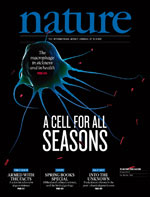 Evolution
Evolution
 Intelligent Design
Intelligent Design
“We Tell Ourselves Stories in Order to Live”: More on Philip Ball in Nature
 We’ve already referred you to Philip Ball’s important recent commentary article in Nature, “DNA: Celebrate the unknowns.” See David Klinghoffer’s previous article, and our own. Ball challenges scientists not to oversimplify what we know about DNA, and not to oversell what we don’t know about how evolutionary processes operate on the genome. Ball is not a fan of intelligent design. In fact, he takes the position that “It remains beyond serious doubt that Darwinian natural selection drives much, perhaps most, evolutionary change.” But his critique is one that interests those of us in the ID camp.
We’ve already referred you to Philip Ball’s important recent commentary article in Nature, “DNA: Celebrate the unknowns.” See David Klinghoffer’s previous article, and our own. Ball challenges scientists not to oversimplify what we know about DNA, and not to oversell what we don’t know about how evolutionary processes operate on the genome. Ball is not a fan of intelligent design. In fact, he takes the position that “It remains beyond serious doubt that Darwinian natural selection drives much, perhaps most, evolutionary change.” But his critique is one that interests those of us in the ID camp.
Ball hits the nail on the head when it comes to one of the difficulties in having a reasoned discussion on dearly held theories:
Why this apparent reluctance to acknowledge the complexity? One roadblock may be sentimentality. Biology is so complicated that it may be deeply painful for some to relinquish the promise of an elegant core mechanism. In cosmology, a single, shattering fact (the Universe’s accelerating expansion) cleanly rewrote the narrative. But in molecular evolution, old arguments, for instance about the importance of natural selection and random drift in driving genetic change, are now colliding with questions about non-coding RNA, epigenetics and genomic network theory. It is not yet clear which new story to tell…When the structure of DNA was first deduced, it seemed to supply the final part of a beautiful puzzle, the solution for which began with Charles Darwin and Gregor Mendel. The simplicity of that picture has proved too alluring.
 People fall in love with narratives. This is human nature. It happens on a personal level when a mother refuses to believe her child has done something wrong, and it happens in the professional context when executives refuse to see that their company is collapsing. Memorably, Joan Didion said “We tell ourselves stories in order to live.” Sometimes we are so in love with the story that we are unwilling to acknowledge evidence to the contrary. It can happen to anyone, which is why encouraging open, reasoned debate and conversation about such evidence is important in science or any field of study.
People fall in love with narratives. This is human nature. It happens on a personal level when a mother refuses to believe her child has done something wrong, and it happens in the professional context when executives refuse to see that their company is collapsing. Memorably, Joan Didion said “We tell ourselves stories in order to live.” Sometimes we are so in love with the story that we are unwilling to acknowledge evidence to the contrary. It can happen to anyone, which is why encouraging open, reasoned debate and conversation about such evidence is important in science or any field of study.
Another aspect of human nature is that we are competitive (which Darwinists readily acknowledge), so conceding that the other side may have a point is, for most of us, a hard pill to swallow. We’ve found again and again that defenders of Darwinian theory typically have a difficult time even accurately characterizing what the theory of intelligent design says, much less giving proper credit to the strength of its challenge. That’s how deep the competitive impulse goes.
For years, ID proponents have been writing and reporting on research that seems to fly in the face of neo-Darwinian theory. Scientists at Biologic Institute have conducted research demonstrating problems with current theories on enzyme evolution. ID theorists have published books on the extent and limits of evolutionary processes on things like drug resistance of malaria-carrying mosquitoes. They have written books on the explanatory inadequacy of current chemical evolution theories, and books discussing the fine-tuning of the universe.
Even if one does not care for the idea of design detection in nature, these works as well as the research reported here at ENV raise important questions for evolutionary theory. When a theory leads, as Darwinism does, to mistaken conclusions about the non-coding regions of DNA, or oversimplifies genetics to the point that epigenetic factors have been largely ignored, then that theory may need, at the very least, to be modified if not scrapped and replaced by a better explanation.
Originally, in sitting down to write this, we planned to report on yet another finding of the complexity of DNA, specifically relating to the number of proteins involved in the replication process. Replication is a key precondition for natural selection to operate, yet studies show that even replication requires multiple proteins operating in a complex, intricate process that is too highly integrated to be explicable by the current Darwinian narrative.
And while this is an interesting paper, and worth reading (see here) — perhaps we’ll have more to say on it later — Philip Ball’s commentary provides the even more interesting and important philosophical background to why we were going to report on that paper in the first place.
